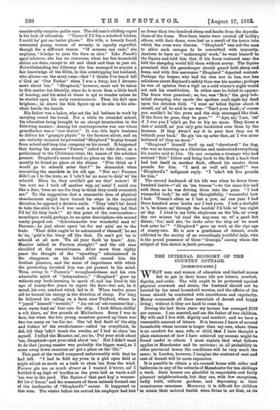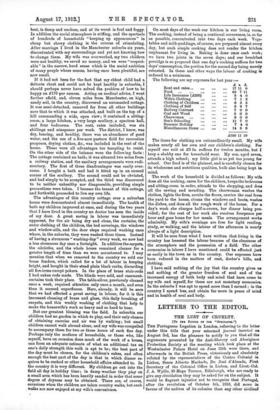THE INTERNAL ECONOMY OF THE COUNTRY COTTAGE. [COMMIINICATED3
WHAT men and women of education and limited means fail to get in their home life are leisure, comfort, dignity, and order. The wife ought to be protected against physical overwork and strain, the husband should not be harried by the usual household worries, and the affairs of the house should be conducted with smoothness and regularity. Money commands all these essentials of decent and happy living ; without it they are hard to come by.
Daring the last three years my income has averaged £170 per annum. I am married, and am the father of two children. My wife and I live with dignity and comfort ; and we have a reasonable amount of leisure. It is because I know of several households whose income is larger than my own, where there is no comfort for man, wife, or child, that I have thought a plain statement of how I have achieved my success might be found useful to others. I must explain that what follows applies to Manchester and its environs ; in all probability in other provincial towns the conditions will be very much the same; in London, however, I imagine the matters of rent and cost of transit will be more expensive.
It is possible to obtain a six-roomed house with cellar and bathroom in any of the suburbs of Manchester for ten shillings a week. Such houses are plentiful in respectable and fairly pleasant neighbourhoods, but they are, with few exceptions, badly built, without gardens, and depressing in their monotonous sameness. Moreover, it is difficult for children to retain their natural health when livine in air that, at its best, is damp and unclean, and at its worst is foul and foggy. In addition the social atmosphere is stifling, and the spectacle of hundreds of households "keeping up appearances" in cheap but showy clothing is the reverse of stimulating. After marriage I lived in the Manchester suburbs six years, discontented with my surroundings and yet not knowing how to change them. My wife was overworked, my two children were not healthy, we saved no money, and we were "respect- able " in the narrow, hard sense which is the social ambition of many people whose means, having once been plentiful, are now small.
If it had not been for the fact that my eldest child had a delicate chest and could not be kept healthy in suburbia, I should perhaps never have solved the problem of bow to be happy on £170 per annum. Acting on medical advice, I went farther afield, and, eleven miles from Manchester, on high, sandy soil, in the country, discovered an untenanted cottage. It was semi-detached, removed far from all other buildings save that to which it was attached, and built on the top of a hill commanding a wide, open view ; it contained a sitting. room, a large kitchen, a very large scullery, a spacious hall, and four bedrooms. The rent, rates included, was six shillings and ninepence per week. The district, I knew, was dry, bracing, and healthy, there was an abundance of good water, and the use of a five-acre pasture field for recreation purposes, drying clothes, &c., was included in the rent of the house. These were all advantages too tempting to resist. On the other side of the balance were the following facts : The cottage contained no bath; it was situated two miles from a railway station, and the sanitary arrangements were rudi- mentary. The first of these disadvantages was easily over. come. I bought a bath and had it fitted up in an unused corner of the scullery. The second could not be obviated, and had simply to be accepted, and the third was discovered to be neither unhealthy nor disagreeable, providing simple precautions were taken. I became the tenant of this cottage, and forthwith proceeded to live my own life.
The advantages of this country cottage over a suburban house were demonstrated almost immediately. The health of both my children improved at once, and during the two years that I have lived in the country no doctor has seen the inside of my door. A great saving in labour was immediately apparent, for the air being dry and clean, the curtains, the outer clothing of the children, the bed coverings, the windows and window-sills, and the door steps required washing once where, in the suburbs, they were washed three times. Instead of having a strenuous "washing-day" every week, we now had a less strenuous day once a fortnight. In addition the carpets, the oilcloths, and the whole house remained cleaner for a greater length of time than we were accustomed to. I may mention that when we removed to the country we sold our brass fenders, which called for a lot of labour in keeping bright, and bought in their stead plain black curbs, discarding all fire-irons except pokers. In the place of brass stair-rods I had oaken rods made. The blinds were sold, and casement- curtains took their place. The table-silver, previously cleaned once a week, required attention only once a month, and even then it seemed superfluous. Here, already, it will be seen that we had effected a great saving in labour, for it is this incessant cleaning of brass and glass, this daily brushing of carpets, and this weekly washing of clothing that help to make the housewife's work so heavy and so hard to bear.
But our greatest blessing was the field. In suburbia our children had no garden in which to play, and their only chance of obtaining exercise and air was by walking ; but small children cannot walk abroad alone, and my wife was compelled to accompany them for two or three hours of each fine day. Perhaps only the mothers of households, or those who, like myself, have on occasion done much of the work of a house, can form an adequate estimate of what an additional tax on one's daily strength this walk is apt to be; the best part of the day must be chosen, for the children's sakes, and often enough the best part of the day is that in which dinner re- quires to be cooked or other household affairs attended to. In the country it is very different. My children go out into the field all day in holiday time ; in damp weather they play on a small area which has been heavily sanded in order that some degree of dryness may be obtained. There are, of course, occasions when the children are taken country walks, but such walks are now enjoyed at my wife's convenience. On most days of the week our kitchen is our living room. The cooking, instead of being a continual occurrence, is, so far as possible, concentrated into two days each week. Vege- tables and milk-puddings, of course, are prepared almost every day, but such simple cooking does not render the kitchen unpleasant for living in. Baking is done once each week; we have two joints in the seven days ; and our breakfast porridge is so prepared that one day's cooking suffices for two days' consumption, the portion for the second day being merely reheated. In these and other ways the labour of cooking is reduced to a minimum.
The following are my expenses for last year :-
£ s. d.
Rent and rates... ... ... ... 17 11 0 Food ... 62 711 Life Insurance (4200)
8 4 0 Wife's Clothing ...
7 1 2 Clothing of Children ... ... 6 8 5 Clothing of Self ... ... 6 9 7 Railway Contract ...
7 0 0 Coal and Wood ... *** ... 5 0 0 Charwoman ... ... 8 0 0 Son's Schooling
...
11 7 0 Summer Holiday ... ... ... 7 4 0 Miscellaneous Items ... ... ... 14 3 9 £160 11 10 The items for clothing are extraordinarily small. My wife makes nearly all her own and our children's clothing. For myself one suit at £3 5s. suffices for twelve months, but I keep a shabby one for household wear. My son, aged seven, attends a high school; my little girl is as yet too young for school. Our food is of the plainest, and is carefully chosen for its wholesome and nutritious qualities, bulk also being kept in mind.
The work of the household is divided as follows : My wife does all the cooking, cares for the children, keeps the bedrooms and sitting-room in order, attends to the shopping, and does all the sewing and mending. The charwoman washes the clothes, lights the fires, scrubs the floors, carries the coal from the yard to the house, cleans the windows and boots, washes the dishes, and does all the rough work of the house. For a day's wash she charges half-a-crown, her dinner being pro. vided ; for the rest of her work she receives fourpence per hour and goes home for her meals. The arrangement works admirably. My wife's evenings are free for light reading, study, or walking, and the labour of the afternoon is nearly always of a light description.
It will be seen from what I have written that living in the country has lessened the labour because of the cleanness of the atmosphere and the possession of a field. The other economies in labour I have mentioned could be effected just as easily in the town as in the country. Our expenses have been reduced in the matters of rent, doctor's bills, and clothing.
I have said nothing of the joy that the country gives us and nothing of the greater freedom of soul and of the increased energy of both body and mind that have come to my wife and myself, for these are not monetary economies. In the suburbs I was apt to spend more than I earned ; in the country I spend less, and obtain far more in peace of mind and in health of soul and body.







































 Previous page
Previous page